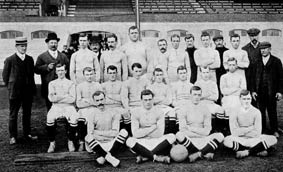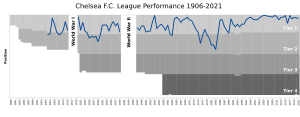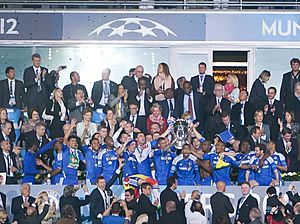Chelsea F.C. facts for kids
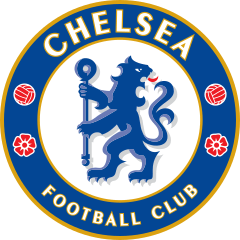 |
|||
| Full name | Chelsea Football Club | ||
|---|---|---|---|
| Nickname(s) | The Blues | ||
| Founded | 10 March 1905 | ||
| Ground | Stamford Bridge | ||
| Capacity | 40,173 | ||
| Coordinates | 51°28′54″N 0°11′27″W / 51.48167°N 0.19083°W | ||
| Owner | BlueCo | ||
| Chairman | Todd Boehly | ||
| Head coach | Enzo Maresca | ||
| League | Premier League | ||
| 2018–19 | Premier League, 3rd of 20 | ||
|
|
|||
Chelsea Football Club is a professional football team from Fulham, West London, England. The club started in 1905 and was named after the nearby area of Chelsea. They play in the Premier League, which is the top football league in England. Their home games are played at Stamford Bridge. Since 2022, the club has been owned by BlueCo.
Chelsea won their first big trophy, the First Division championship, in 1955. They won their first Premier League title in the 2004–05 season with José Mourinho as manager. Overall, Chelsea has won six top-tier league titles. They have also won eight FA Cups, five League Cups, and four FA Community Shields. This makes them the fifth-most successful club in English football.
On the international stage, Chelsea won their first European trophy, the Cup Winners’ Cup, in 1971. They won it again in 1998. They then won their first UEFA Champions League title in 2012 and again in 2021. Chelsea has won the UEFA Europa League twice, in 2013 and 2019. After winning the UEFA Conference League in 2025, Chelsea became the first club to win all four main UEFA competitions. They also won the FIFA Club World Cup in 2021 and 2025. The 2025 win was the first time the tournament had 32 teams.
Chelsea has rivalries with other London teams like Arsenal, Tottenham Hotspur, and Fulham. They also have a rivalry with Leeds United.
Contents
- Chelsea's History: From Founding to Today
- Chelsea's Home: Stamford Bridge Stadium
- Chelsea's Identity: Crest, Colours, and Songs
- Chelsea's Supporters and Rivalries
- Chelsea's Records and Statistics
- Club Ownership and Money
- Chelsea's Players
- Chelsea's Management Team
- Chelsea's Trophies and Honours
- Chelsea Women's Team
- More About Chelsea
- See also
Chelsea's History: From Founding to Today
How Chelsea Started (1905–1952)
In 1904, Gus Mears bought the Stamford Bridge athletics stadium. He wanted to turn it into a football ground. He offered to rent it to Fulham F.C., but they said no. So, Mears decided to start his own club to use the stadium. Since there was already a team called Fulham, he chose the name of the next area, Chelsea. Chelsea F.C. was officially founded on March 10, 1905, at The Rising Sun pub. This pub is now called The Butcher's Hook. Soon after, Chelsea joined the Football League.
Chelsea moved up to the First Division in their second season. For many years, they moved between the First and Second Divisions. They reached the 1915 FA Cup final in 1915 but lost to Sheffield United. In 1920, they finished third in the First Division, which was their best league result at that time. Chelsea was known for signing famous players and attracted large crowds. They had the highest average attendance in English football in ten different seasons during their early years.
Modern Changes and First League Title (1952–1983)
In 1952, Ted Drake, a former player for Arsenal and England, became manager. He made many modern changes to the club. He removed the old club badge, improved the youth training, and brought in smart new players. Drake led Chelsea to their first major trophy, the League championship, in the 1954–55 season. The next season, UEFA created the European Champions' Cup. However, Chelsea was asked to withdraw from the competition by The Football League.
Chelsea did not continue their success after this win. They spent the rest of the 1950s in the middle of the league table. Drake was replaced by player-coach Tommy Docherty in 1961. Docherty built a new team with talented young players from the club's youth system. Chelsea competed for trophies throughout the 1960s but often just missed out. They won the League Cup in 1965 but didn't win the other two trophies they were competing for that season.
Under Docherty's replacement, Dave Sexton, Chelsea won the FA Cup in 1970. They beat Leeds United 2–1 in a replay. The next year, Chelsea won their first European trophy, the UEFA Cup Winners' Cup. They beat Real Madrid in Athens after a replay.
Stadium Changes and Financial Challenges (1983–2003)
The late 1970s and 1980s were tough for Chelsea. A big plan to rebuild Stamford Bridge caused financial problems for the club. Star players were sold, and the team was relegated to a lower league. There were also problems with some fans who caused trouble. In 1982, when things were at their worst, Ken Bates bought Chelsea for just £1. Bates bought most of the club. However, the land where Stamford Bridge stood had been sold to property developers. This meant the club could lose its home.
On the field, the team struggled and almost dropped to the Third Division. But in 1983, manager John Neal put together a strong new team without spending much money. Chelsea won the Second Division title in 1983–84. They stayed in the top division for a few years but were relegated again in 1988. The club quickly bounced back, winning the Second Division championship in 1988–89.
After a long legal fight, Bates managed to get the stadium land back for the club in 1992. In the mid-1990s, Chelsea fan and businessman Matthew Harding became a director. He loaned the club £26 million to build a new stand and buy new players. Chelsea's performance in the new Premier League was not great, but they did reach the 1994 FA Cup final.
When Ruud Gullit became player-manager in 1996, things improved. He brought in several top international players. He led the club to their first major trophy since 1971, the FA Cup. Gianluca Vialli replaced Gullit. Under Vialli, Chelsea won the League Cup, the UEFA Cup Winners' Cup, and the UEFA Super Cup in 1998. They also won the FA Cup in 2000. They had a strong challenge for the league title in 1998–99, finishing close behind Manchester United. They also played in the UEFA Champions League for the first time. Vialli was replaced by Claudio Ranieri, who helped Chelsea reach the 2002 FA Cup final and qualify for the Champions League in 2002–03.
The Abramovich Era (2003–2022)
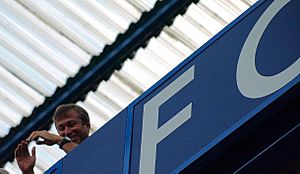
In June 2003, Roman Abramovich, a Russian billionaire, bought Chelsea F.C. for £60 million. He also took on the club's £80 million debt and quickly paid some of it off. Over £100 million was spent on new players. However, manager Ranieri could not win any trophies. He was replaced by José Mourinho.
Under Mourinho, Chelsea became the fifth English team to win back-to-back league championships (2004–05 and 2005–06). They also won an FA Cup (2007) and two League Cups (2005 and 2007). After a bad start to the 2007–08 season, Mourinho was replaced by Avram Grant. Grant led the club to their first UEFA Champions League final, but they lost on penalties to Manchester United.
In 2009, with Guus Hiddink as caretaker manager, Chelsea won another FA Cup. In 2009–10, Carlo Ancelotti led them to their first Double (winning both the Premier League and FA Cup). They were the first English top-flight club to score 100 league goals in a season since 1963. In 2012, Roberto Di Matteo led Chelsea to their seventh FA Cup and their first UEFA Champions League title. They beat Bayern Munich on penalties, becoming the first London club to win this trophy.
The next year, the club won the UEFA Europa League. This made them the first club to hold two major European titles at the same time. Mourinho returned as manager in 2013. He led Chelsea to League Cup success in March 2015 and the Premier League title two months later. Mourinho was sacked after a poor start to the next season.
In 2017, under new coach Antonio Conte, Chelsea won their sixth English title. The next season, they won their eighth FA Cup. In 2018, Conte was replaced by Maurizio Sarri. Under Sarri, Chelsea reached the League Cup final, losing to Manchester City. They also won the Europa League for a second time, beating Arsenal 4–1 in the final. Sarri then left, and former Chelsea player Frank Lampard took over.
In Lampard's first season (2019–20), he guided Chelsea to fourth place in the Premier League. They also reached the FA Cup final, losing to Arsenal. Lampard was dismissed in January 2021 and replaced by Thomas Tuchel.

Under Tuchel, Chelsea reached the FA Cup final, losing to Leicester City. They then won their second UEFA Champions League title with a 1–0 win over Manchester City in Porto. The club also won the 2021 UEFA Super Cup and their first 2021 FIFA Club World Cup in Abu Dhabi.
In April 2021, Chelsea announced they would join a new European Super League. However, after many fans protested, the club withdrew days later. During the COVID-19 pandemic, Chelsea did not furlough their staff. Abramovich also lent the club-owned Millennium Hotel to NHS staff.
Amidst financial sanctions against Russian billionaires in 2022, Abramovich announced he would sell the club. He also said he would donate the money from the sale to victims of the war in Ukraine.
New Ownership: BlueCo (2022–Present)
On May 7, 2022, Chelsea confirmed that a new ownership group, led by Todd Boehly, Clearlake Capital, Mark Walter, and Hansjörg Wyss, would buy the club. This group later became known as BlueCo. The UK government approved the £4.25 billion takeover, ending Abramovich's 19-year ownership. Bruce Buck, the chairman since 2003, was replaced by Boehly.
The club brought in Graham Potter to replace Tuchel on September 8, 2022. Chelsea won six of their first 11 games in the 2022–23 season, but only five of the remaining 27. Potter was sacked on April 2, 2023. Frank Lampard returned as caretaker manager. Under Lampard, the club won only one of their last 11 matches. Chelsea scored a record-low 38 goals that season and finished in the bottom half of the table for the first time since 1995–96.
Mauricio Pochettino was announced as Lampard's replacement in 2023. He led Chelsea to a 6th-place finish, which qualified them for the Conference League play-off round. He also led Chelsea to the 2024 EFL Cup final, where they narrowly lost 1–0 to Liverpool. Pochettino left the club at the end of the season.
On June 3, 2024, Enzo Maresca was announced as Pochettino's replacement. He led Chelsea to win the Conference League after a 4–1 win against Real Betis in the final in Wrocław. This made them the first team to win all of the European trophies. On July 13, 2025, he also guided Chelsea to victory in the 2025 FIFA Club World Cup. Chelsea secured the trophy with a 3–0 win over Champions League winners Paris Saint-Germain in the final.
Chelsea's League Journey
|
|
|
Chelsea's Home: Stamford Bridge Stadium
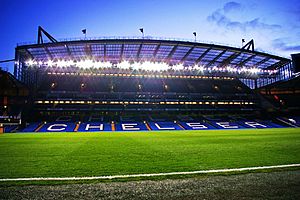
Chelsea has always played at one home ground: Stamford Bridge. They have been there since the club started. The stadium opened on April 28, 1877. For 28 years, it was used for athletics. In 1904, businessman Gus Mears and his brother Joseph bought the ground. They wanted to use it for football matches. Stamford Bridge was designed by Archibald Leitch, a famous football architect. Most clubs start first and then find a ground. But Chelsea was founded specifically for Stamford Bridge.
Stamford Bridge first had an open, bowl-like design and one main stand with seats. It could hold about 100,000 people, making it the second-biggest stadium in England at the time. In the early 1930s, a covered terrace was built on the south side. This stand became known as the "Shed End" and was home to Chelsea's most loyal fans.
In the early 1970s, the club planned to build a modern 50,000-seat stadium. Work began in 1972, but there were many problems. Only the East Stand was finished, and the costs almost bankrupted the club. The land was sold to developers, and Chelsea faced losing their home. After a long legal fight, Chelsea's future at Stamford Bridge was secured in the mid-1990s. Renovation work started again. The north, west, and south parts of the ground were turned into all-seater stands, closer to the pitch. This was finished by 2001. In 1996, the North Stand was renamed the Matthew Harding stand, after a club director who passed away.
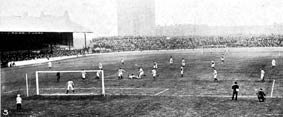
When Stamford Bridge was redeveloped, many other features were added. These included hotels, apartments, shops, and restaurants. The idea was to make more money for the club. However, these facilities were not as successful as hoped. Before Abramovich bought the club in 2003, the debt from these projects was a big problem.
The land, pitch, and Chelsea's naming rights are now owned by Chelsea Pitch Owners. This is a non-profit group where fans are shareholders. The CPO was created to make sure the stadium could never be sold to developers again. Because of this, Chelsea must play its home games at Stamford Bridge. If the club moves to a new stadium, they might have to change their name.
Chelsea's training ground is in Cobham, Surrey. Chelsea moved to Cobham in 2004. The new training facilities were completed in 2007.
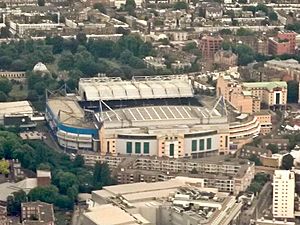
Stamford Bridge has hosted many important matches. It held the FA Cup final from 1920 to 1922. It has also hosted 10 FA Cup Semi-finals and three England international matches. The 2013 UEFA Women's Champions League final was also played there.
The stadium has been used for other sports too. In 1905, it hosted a rugby union match. In 1914, it had a baseball game. It was also used for boxing, dirt track racing, and greyhound racing. In 1980, Stamford Bridge hosted the first international floodlit cricket match in the UK.
The club's owners believe a larger stadium is needed to compete with other big clubs. However, expanding Stamford Bridge is difficult because of its location next to a main road and railway lines. The club wants to stay at their current home. In January 2017, plans to redevelop Stamford Bridge into a 60,000-seat stadium were approved. But in May 2018, the project was put on hold. In July 2022, it was reported that the new owner, Todd Boehly, appointed an architect to oversee stadium renovations.
Chelsea's Identity: Crest, Colours, and Songs
Club Crest and What It Means
Chelsea has had four main club badges, with small changes over time. The first badge, from when the club started, showed a Chelsea Pensioner. These are army veterans who live at the nearby Royal Hospital Chelsea. This led to the club's first nickname, "the Pensioners." This badge was used for 50 years but never appeared on the shirts.
When Ted Drake became manager in 1952, he wanted to modernize the club. He thought the Chelsea pensioner badge was old-fashioned. For one year, a simple badge with the letters C.F.C. was used. In 1953, the club badge changed to a blue lion standing up, looking backward, and holding a staff. This design came from the coat of arms of the area of Chelsea. The lion came from the family crest of Viscount Chelsea, who was the club president. The staff came from the Abbots of Westminster, who used to own the land. This badge also had three red roses for England and two footballs. This was the first Chelsea badge to appear on the team's shirts in the early 1960s.
In 1986, when Ken Bates owned the club, the badge changed again. This was part of another effort to modernize and because the old lion badge could not be protected by trademark. The new badge showed a more realistic lion, in white, standing over the letters C.F.C. This badge was used for 19 years, with some color changes. In 2005, with Roman Abramovich as the new owner and the club's 100th birthday coming up, fans wanted the popular 1950s badge back. So, the club decided to change the crest again. The new badge, used since the 2005–06 season, brought back the blue lion holding a staff. For the 100th anniversary season, it also said '100 Years' and 'Centenary 2005–2006'.
Team Colours and Kits
|
|
| Chelsea's first home colours (1905 – c. 1912) |
Chelsea has always worn blue shirts. At first, they used a lighter blue called eton blue. This color came from the racing colors of the club president, Earl Cadogan. They wore these shirts with white shorts and dark blue or black socks. Around 1912, the light blue shirts were changed to royal blue.
In the 1960s, Chelsea manager Tommy Docherty changed the kit again. He switched to blue shorts (which they still wear today) and white socks. He thought this made the club's colors more modern and unique. No other big team used that combination. This kit was first worn during the 1964–65 season. Since then, Chelsea has almost always worn white socks with their home kit.
Chelsea's away kits are usually all yellow or all white with blue trim. More recently, they have had black or dark blue away kits that change every year. They have also had some unusual ones. In the 1966 FA Cup semi-final, they wore blue and black stripes, like Inter Milan's kit. In the mid-1970s, the away kit was red, white, and green, inspired by the Hungarian national team. Other away kits included an all-jade strip (1986–1989) and graphite and tangerine (1994–1996).
Songs and Fan Chants
The song "Blue is the Colour" was released in 1972 before the League Cup final. All the Chelsea first-team players sang it, and it reached number five in the UK music charts. Many other sports teams around the world have used this song.
Chelsea also released "No One Can Stop Us Now" in 1994 and "Blue Day" in 1997. "Blue Day" was sung by Suggs and Chelsea players. In 2000, Chelsea released "Blue Tomorrow".
At matches, Chelsea fans sing many chants. Some popular ones are "Carefree", "Ten Men Went to Mow", "We All Follow the Chelsea", and "Zigga Zagga". Fans also sing the celebratory "Celery". This song is often sung while fans throw celery at each other. However, celery was banned inside Stamford Bridge after an incident in 2007. Other popular chants include "Super Chelsea" and "Super Frank" (for Frank Lampard).
Chelsea's Supporters and Rivalries
Fan Support for Chelsea
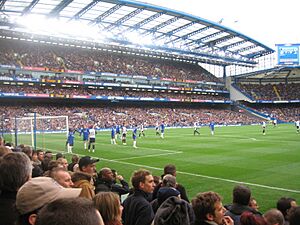
Chelsea is one of the most supported football clubs in the world. It has the sixth-highest average attendance in the history of English football. They regularly have over 40,000 fans at Stamford Bridge. In the 2023–24 season, they were the ninth best-supported Premier League team.
Chelsea's fans come from all over the Greater London area and nearby counties. There are many official fan clubs in the UK and worldwide. Between 2007 and 2012, Chelsea was ranked fourth globally in sales of replica kits. As of 2023, Chelsea has 118.9 million followers on social media, which is the fourth highest among football clubs.
In the 1970s and 1980s, some Chelsea supporters were involved in football hooliganism. The club's "football firm" was known for violence. However, since the 1990s, crowd trouble at matches has greatly decreased. This is due to stricter policing, cameras in stadiums, and all-seater stadiums.
Club Rivalries
Chelsea has long-standing rivalries with North London clubs Arsenal and Tottenham Hotspur. A strong rivalry with Leeds United began with intense matches in the 1960s and 1970s. More recently, a rivalry with Liverpool has grown due to many cup matches. Other London clubs like Brentford, Fulham, and Queens Park Rangers are also considered rivals.
A 2012 survey found that Chelsea fans consider Tottenham to be their main rivals, followed by Arsenal and Manchester United. Fans of many other clubs also see Chelsea as one of their top rivals.
Chelsea's Records and Statistics
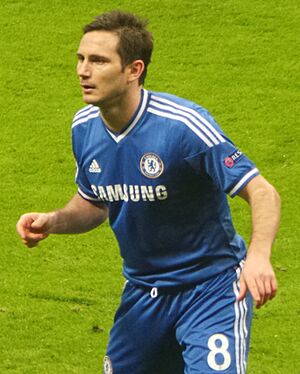
Chelsea's player with the most appearances is former captain Ron Harris. He played in 795 games for the club between 1961 and 1980. Five other players have played over 500 games for Chelsea: Peter Bonetti, John Terry, Frank Lampard, John Hollins, and César Azpilicueta. With 103 games for England, Lampard is Chelsea's most capped international player.
Frank Lampard is Chelsea's all-time top goalscorer, with 211 goals in 648 games (2001–2014). He broke Bobby Tambling's record in May 2013. Eight other players have scored over 100 goals for Chelsea. Jimmy Greaves holds the club record for most goals in one season (43 in 1960–61).
Chelsea's biggest win in a competitive match was 13–0 against Jeunesse Hautcharage in 1971. Their biggest top-flight win was 8–0 against Wigan Athletic in 2010, and again against Aston Villa in 2012. Chelsea's biggest loss was 8–1 against Wolverhampton Wanderers in 1953. Their 21–0 total victory over Jeunesse Hautcharage in 1971 is a record in European competitions.
The highest official home attendance for Chelsea was 82,905 for a match against Arsenal in 1935. However, an estimated 100,000 people attended a friendly match against Dynamo Moscow in 1945.
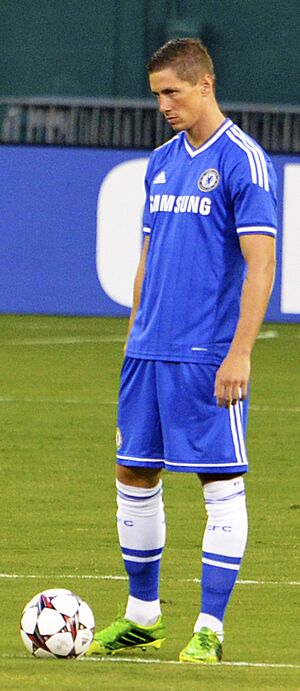
From March 20, 2004, to October 26, 2008, Chelsea went a record 86 consecutive league matches at home without losing. Chelsea holds the English record for the fewest goals conceded in a league season (15) and the most clean sheets (25) in a Premier League season, both set in 2004–05. They also hold the record for most consecutive clean sheets from the start of a league season (6, set in 2005–06). Chelsea is the only Premier League team to win its first nine league games of the season, doing so in 2005–06. From 2009 to 2013, Chelsea was unbeaten in a record 29 consecutive FA Cup matches.
Chelsea's Firsts in Football
On August 25, 1928, Chelsea and Arsenal were the first clubs to play with shirt numbers. This happened in their match against Swansea Town.
Chelsea was the first English team to travel by plane for a domestic away match. This was on April 19, 1957, when they visited Newcastle United. They were also the first First Division team to play a match on a Sunday, on January 27, 1974, against Stoke City. On December 26, 1999, Chelsea became the first British team to have a starting lineup made entirely of foreign players in a Premier League match.
In May 2007, Chelsea was the first team to win the FA Cup at the new Wembley Stadium. They had also been the last to win it at the old Wembley. They were the first English club to be ranked No. 1 in UEFA's five-year ranking system in the 21st century. They were the first Premier League team to score at least 100 goals in a single season, reaching this in the 2009–10 season.
Chelsea is the only London club to have won the UEFA Champions League, winning in the 2011–12 season. After winning the 2012–13 UEFA Europa League, Chelsea became the first English club to win all three major UEFA club trophies. They were also the only club to hold the Champions League and Europa League at the same time.
In 2025, Chelsea became the first club to have won all four main UEFA club competitions. This includes the Champions League, Cup Winners' Cup, Europa League, and Conference League. They are also the first and only club (as of 2025) to have won all three pre-1999 main UEFA club competitions more than once each. Chelsea has also won the UEFA Super Cup twice and the UEFA Youth League twice. Chelsea is also the only London club to have won both the Champions League and the FIFA Club World Cup.
Chelsea has broken the record for the highest transfer fee paid by a British club three times. Their £30.8 million purchase of Andriy Shevchenko in 2006 was a British record until 2008. The club's £50 million purchase of Fernando Torres in 2011 held the record until 2014. The club's £71 million purchase of Kepa Arrizabalaga in 2018 remains a world record fee paid for a goalkeeper. In 2023, Chelsea broke the spending record in the winter transfer window, spending £289 million on eight new players. The £106.8 million signing of Enzo Fernandez broke the British transfer record.
Club Ownership and Money
Chelsea Football Club was founded by Gus Mears in 1905. His family owned the club until 1982, when Ken Bates bought it for £1. Bates then sold shares of the club on the stock exchange. In the mid-1990s, Chelsea fan and businessman Matthew Harding became a director. He loaned the club £26 million to build a new stand and buy players.
In July 2003, Roman Abramovich bought most of Chelsea Village plc's shares for £30 million. Over the next few weeks, he bought out most of the other shareholders, completing a £140 million takeover. When Abramovich took over, the club had about £100 million in debt. Abramovich paid off some of this debt right away. By 2008, all the debt was repaid.
Abramovich changed the club's ownership name to Chelsea FC plc. He funded Chelsea through interest-free loans from his company. In December 2009, these loans, which totaled £709 million, were converted into equity. This meant the club itself had no external debt, though the debt remained with Abramovich's company.
Chelsea did not make a profit in the first nine years of Abramovich's ownership. They had record losses of £140 million in June 2005. However, in November 2012, Chelsea announced a profit of £1.4 million for the year ending June 30, 2012. This was the first time the club made a profit under Abramovich. After a loss in 2013, they made their highest profit ever of £18.4 million in 2014. In 2018, Chelsea announced a record after-tax profit of £62 million.
Chelsea is seen as a global brand. A 2012 report ranked Chelsea as the fifth most valuable football brand in the world. In 2016, Forbes magazine ranked Chelsea as the seventh most valuable football club, worth £1.15 billion. As of May 2022, Chelsea was ranked the eighth-most valuable club in the world by Forbes.
On February 26, 2022, during the Russo-Ukrainian War, Abramovich handed over control of Chelsea FC to the Chelsea Charitable Foundation. On March 2, 2022, Abramovich confirmed he was selling the club. On March 10, the British government froze Abramovich's assets. However, Chelsea was allowed to continue operating as a football club. On March 12, the Premier League disqualified Abramovich as a director of Chelsea.
On May 7, 2022, the club confirmed that a new ownership group, led by Todd Boehly and Clearlake Capital, had agreed to buy the club. This group was later known as BlueCo. On May 30, the Boehly group completed the purchase of the club. As of 2025, Chelsea is the tenth-most-valuable football club in the world, worth $3.25 billion.
Sponsorship Deals
Chelsea's kit has been made by Nike since July 2017. Before that, Adidas made their kits from 2006 to 2017. In October 2016, Nike was announced as the new kit sponsor in a deal worth £900 million over 15 years. Before Adidas, Umbro and Le Coq Sportif made Chelsea's kits.
Chelsea's first shirt sponsor was Gulf Air in 1983–84. Other sponsors included Grange Farms, Bai Lin Tea, and Simod. A long-term deal was signed with Commodore International in 1989. Later sponsors included Coors beer (1994–97), Autoglass (1997–2001), Emirates (2001–05), Samsung Mobile (2005–08), Samsung (2008–15), and Yokohama Tyres (2015–20). From July 2020, Chelsea's sponsor was Three. However, Three temporarily stopped its sponsorship in March 2022 due to sanctions against Abramovich. They restored their sponsorship after the club's ownership changed.
Since the Premier League introduced sleeve sponsors, Chelsea has had Alliance Tyres (2017–18), Hyundai Motor Company (2018–19), and WhaleFin (2022–23). In 2023–24, Infinite Athlete became the main shirt sponsor, and BingX became the sleeve sponsor. In 2025, DAMAC became the main shirt sponsor, and Live Nation became the sleeve sponsor.
Chelsea also has many other sponsors and partners, including Cadbury, EA Sports, FICO, Hilton Worldwide, MSC Cruises, Oman Air, Parimatch, Rexona, Singha, The St. James, Trivago, and BingX.
Kit Makers and Shirt Sponsors
| Period | Kit manufacturer | Shirt sponsor (chest) | Shirt sponsor (sleeve) |
|---|---|---|---|
| 1975–1981 | Umbro | – | – |
| 1981–1983 | Le Coq Sportif | ||
| 1983–1984 | Gulf Air | ||
| 1984–1986 | – | ||
| 1986–1987 | The Chelsea Collection | Bai Lin Tea | |
| 1987 | Simod | ||
| 1987–1993 | Umbro | Commodore | |
| 1993–1994 | Amiga | ||
| 1994–1997 | Coors | ||
| 1997–2001 | Autoglass | ||
| 2001–2005 | Emirates | ||
| 2005–2006 | Samsung | ||
| 2006–2015 | Adidas | ||
| 2015–2017 | Yokohama Tyres | ||
| 2017–2018 | Nike | Alliance Tire Company | |
| 2018–2020 | Hyundai | ||
| 2020–2022 | Three | ||
| 2022–2023 | WhaleFin | ||
| 2023–2024 | Infinite Athlete | BingX | |
| 2024–2025 | – | Fever | |
| 2025 | DAMAC | Live Nation | |
| 2025– | – | – |
Chelsea's Players
First-Team Squad
|
|
Players on Loan
|
|
Other Players Under Contract
|
|
Under-21s and Academy Players
- Players who have played at least one first-team game for Chelsea.
|
|
Chelsea's Management Team
Coaching Staff
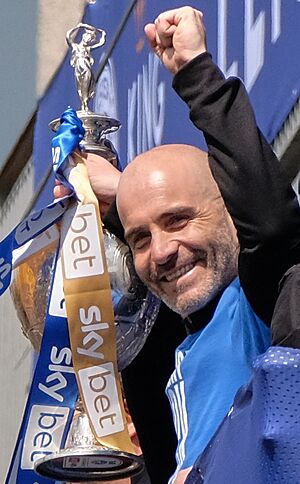
| Position | Staff |
|---|---|
| Head coach | |
| Assistant coach | |
| First team coach | |
| Goalkeeper coaches | |
| Assistant goalkeeper coach | |
| Head of global goalkeeping | |
| Fitness coaches | |
| Player support and development officer | |
| Technical analyst | |
| Match analyst | |
| Loan technical coaches | |
| Under-21s head coach | |
| Under-21s assistant | |
| Under-18s head coach | |
| Under-18s assistant | |
Source: Chelsea F.C.
Managers Who Won Trophies
Here are the managers who won at least one trophy while leading Chelsea:
| Name | Period | Trophies |
|---|---|---|
| 1952–1961 | First Division Championship, Charity Shield | |
| 1962–1967 | League Cup | |
| 1967–1974 | FA Cup, UEFA Cup Winners' Cup | |
| 1981–1985 | Second Division Championship | |
| 1985–1988 | Full Members Cup | |
| 1988–1991 | Second Division Championship, Full Members Cup | |
| 1996–1998 | FA Cup | |
| 1998–2000 | FA Cup, League Cup, Charity Shield, UEFA Cup Winners' Cup, UEFA Super Cup | |
| 2004–2007 2013–2015 |
3 Premier Leagues, 3 League Cups, FA Cup, Community Shield | |
| 2009 2015–2016 |
FA Cup | |
| 2009–2011 | Premier League, FA Cup, Community Shield | |
| 2012 | FA Cup, UEFA Champions League | |
| 2012–2013 | UEFA Europa League | |
| 2016–2018 | Premier League, FA Cup | |
| 2018–2019 | UEFA Europa League | |
| 2021–2022 | UEFA Champions League, UEFA Super Cup, FIFA Club World Cup | |
| 2024– | UEFA Conference League, FIFA Club World Cup |
Club Personnel
Source: Chelsea F.C.
Chelsea's Trophies and Honours
After winning the 2012–13 UEFA Europa League, Chelsea became the fourth club in history to have won the "European Treble." This means winning the European Cup/UEFA Champions League, UEFA Cup/UEFA Europa League, and European Cup Winners' Cup/UEFA Cup Winners' Cup. The other clubs are Juventus, Ajax, and Bayern Munich. Chelsea is the first English club to have won all three major UEFA trophies from the past. After winning the UEFA Conference League in 2025, Chelsea became the first club to win all four main UEFA competitions.
| Type | Competition | Titles | Seasons |
|---|---|---|---|
| Domestic | First Division/Premier League | 6 | 1954–55, 2004–05, 2005–06, 2009–10, 2014–15, 2016–17 |
| Second Division | 2 | 1983–84, 1988–89 | |
| FA Cup | 8 | 1969–70, 1996–97, 1999–2000, 2006–07, 2008–09, 2009–10, 2011–12, 2017–18 | |
| Football League Cup/EFL Cup | 5 | 1964–65, 1997–98, 2004–05, 2006–07, 2014–15 | |
| FA Charity Shield/FA Community Shield | 4 | 1955, 2000, 2005, 2009 | |
| Full Members' Cup | 2s | 1985–86, 1989–90 | |
| Continental | UEFA Champions League | 2 | 2011–12, 2020–21 |
| UEFA Europa League | 2 | 2012–13, 2018–19 | |
| UEFA Conference League | 1s | 2024–25 | |
| UEFA Cup Winners' Cup | 2 | 1970–71, 1997–98 | |
| UEFA Super Cup | 2 | 1998, 2021 | |
| Worldwide | FIFA Club World Cup | 2 | 2021, 2025 |
- record
- s shared record
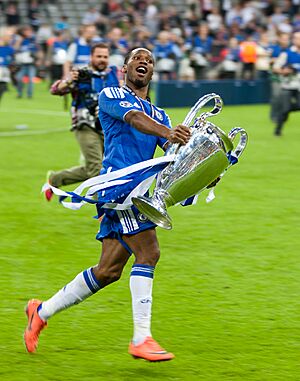
Winning Two Trophies in a Season (Doubles)
- Premier League and FA Cup: 2009–10
- Premier League and League Cup: 2004–05, 2014–15
- League Cup and European Cup Winners' Cup: 1997–98
- FA Cup and League Cup: 2006–07
- FA Cup and UEFA Champions League: 2011–12
- UEFA Super Cup and FIFA Club World Cup: 2021–22
- UEFA Conference League and FIFA Club World Cup: 2024–25
Chelsea Women's Team
Chelsea also has a women's football team called Chelsea Football Club Women. They have been connected to the men's team since 2004. They play their home games at Kingsmeadow. The club was promoted to the top women's league in 2005. They won the Surrey County Cup nine times between 2003 and 2013.
In 2010, Chelsea Ladies were one of the first eight teams to form the FA Women's Super League. In 2015, Chelsea Ladies won the FA Women's Cup for the first time. A month later, they won their first FA WSL title, completing a league and cup double. In 2018, they won a second league and FA Cup double. Two years later, in 2020, they won their third league title and the FA Women's League Cup for the first time. In the 2020–21 season, Chelsea won a domestic treble, winning the league, FA Cup, and League Cup. They reached the final of the UEFA Women's Champions League for the first time but lost to Barcelona 4–0.
John Terry, who was a famous captain for the Chelsea men's team, is the president of Chelsea Women.
More About Chelsea
- List of world champion football clubs
- Chelsea F.C. Women
See also
 In Spanish: Chelsea Football Club para niños
In Spanish: Chelsea Football Club para niños
 | George Robert Carruthers |
 | Patricia Bath |
 | Jan Ernst Matzeliger |
 | Alexander Miles |


